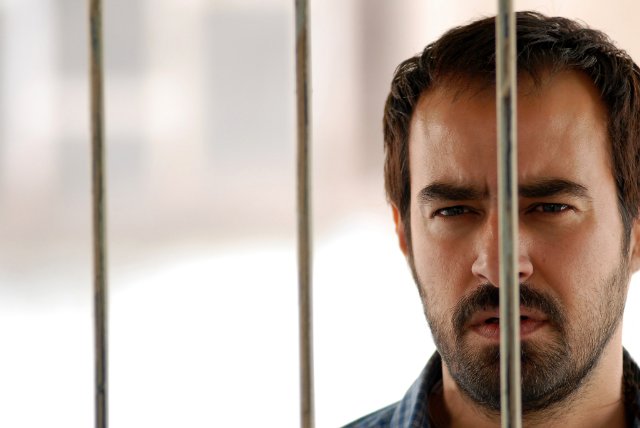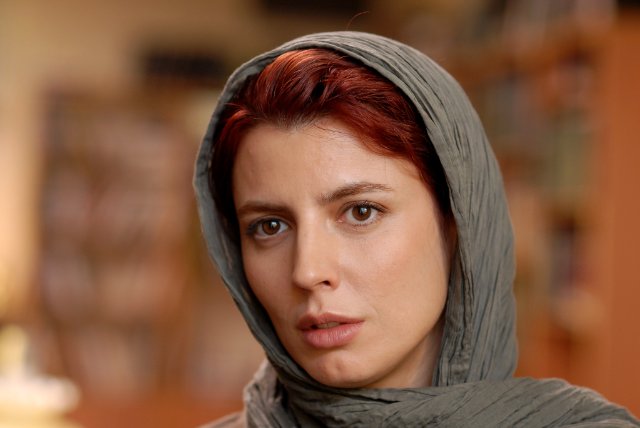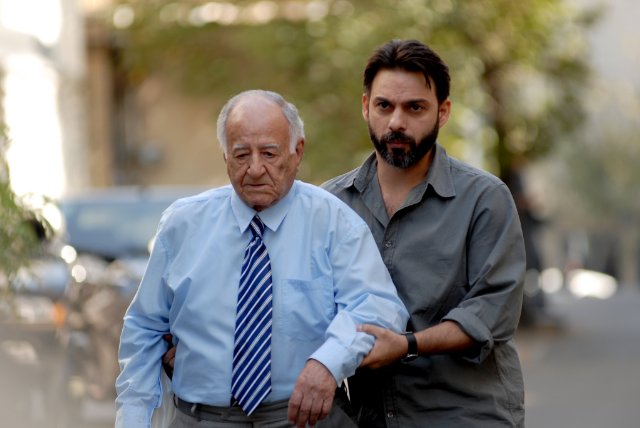Iranian director Asghar Farhadi manages to both enlighten and
mystify. Maybe that's why he's been able to evade both the censors
and jailers who police filmmakers for thought crimes against the
mega-fascist Iranian state. Or maybe because this director/writer so
"honored" Iran by becoming the first Iranian to win an Oscar for
Best Foreign Language Film for
A Separation, he
proved to be too prominent to suppress.
The
film centers on a couple faced with deciding to divorce so the wife
can move elsewhere with her daughter or stay in Iran to look after a
deteriorating parent who has Alzheimer's disease. What starts out as
a domestic drama turns into a legal and religious mystery with odd
twists and turns.
In
any case, A Separation's
success – it played at the 49th New York Film Festival – has offered
a perfect opportunity to further introduce US audiences to Farhadi's
body of work. So the Film Society of Lincoln Center launched the
series "Asghar Farhadi's Iran," which will play April 6-8, 2012, at
the Walter Reade Theater.
Beside A Separation,
Farhadi's four previous films have also received both critical
acclaim and other awards. Though they have been widely seen on the
festival circuit, they rarely are viewable in North America. Among
his other notices, Farhadi also won the Berlin Film Festival's
Silver Bear for Best Director in 2009 for
About Elly – a
well-structured melodrama/mystery about a seaside vacation of an old
group of friends that goes awry and intersperses genre tropes with
deft character development.
Now
established as one of his country's most vital cinematic voices,
Farhadi looks to further negotiate the parameters of honest
filmmaking within a state that bristles when even lightly critiqued.
 The
following Q&A draws on sessions from the NYFF press conference and a
roundtable held around the time of the film's initial release.
The
following Q&A draws on sessions from the NYFF press conference and a
roundtable held around the time of the film's initial release.
The title in English is
A Separation,
which has a wider meaning. Does the Iranian title,
Jodaeiye Nader az Simin,
have the same connotation?
No.
It had too much of a sentimental connotation if I used only the
words "A Separation" in Persian, and I did not want that
sentimentality to be part of the title. After Berlin [International
Film Festival], I thought that for [audiences] abroad, it was better
if it was just A Separation.
But for Iran, I didn't feel that it was a good title. The same
discussion happened in Iran, where people said, "You say this is a
separation of Nader and Simin, but it seems to be the separation of
so many other things." So even though it's not in the title, I think
people get it. The names Nader and Simin have significance in
Persian. Nader means rare, as in not easily found, unique. Simin is
very valuable; it's very precious, like gold – so separating the
precious from the rare.
You've said that this film is a detective story without any
detectives. It's a suspenseful tale without the usual suspense
tricks. How did you work out the script and the dialogue? Both are
brilliant and sharp.
I
start by putting in place very simple details, not big things that
indicate suspense. I build very slowly. It's like creating a
crossword puzzle. Sometimes somebody who creates a crossword puzzle
tries to come up with these really complicated ways of suggesting
the word, but that's not really necessary. Sometimes [it's] very
simple. You give clues and they're simple clues, but the pleasure
for the person who solves the puzzle is in finding out these pieces,
these words, fit into one another.
As suggested by your previous film,
About Elly,
you find a balance between mystery in the story and the
relationships between the characters. Do you start out with the idea
in your head – when do you decide you've got that balance between
mystery and relationship dynamic?
It's
difficult to say when or how that develops, but maybe the storylines
have within themselves that potential to go in that direction. One
of the important things is that I assume that [the] audience is
intelligent, and so I don't want to give too much. I want the
audience to figure out things for themselves. When I give
information about my characters, I don't want to give them directly.
I want my audience to get that information by seeing those
characters within certain circumstances, and the way they respond to
the circumstances is the clue as to who they are. I tried as much as
possible to remain neutral in telling a story of the conflict
between various people. I don't want to take sides between the
various characters.
 The script is layered and complicated, almost like a novel. How long
did it take to write it? How many versions did you do and how did
you keep adding the characters?
The script is layered and complicated, almost like a novel. How long
did it take to write it? How many versions did you do and how did
you keep adding the characters?
It
was a really long time that I had this cooking in my head. But it
was four or five months of actually writing until I produced the
first draft, and then there were other drafts.
You didn't answer certain things, but they were implied, and you
left these little hints though you never gave the complete answer.
Can you go into more detail about how you wanted to leave it open
for us? If you sat there and said, "Yeah, I'm going to leave that
one. I'm not going to answer that one."
First of all, I want to make it clear that I do not hide things.
It's just that I show less or I show without emphasizing. It's like
when somebody shoots a bullet and a person dies. If you've missed
that moment of who actually shot, then you have drama. If you show
that, then there's no story. The more I progressed, the more I tried
to choose the smallest piece of the puzzle and the most
insignificant that still works.
You talk a lot about the puzzle and structure to your writing. Do
you think about character in the same way, and who's your
protagonist if you do?
I
don't understand what it means to have a main protagonist. It's a
collective – a group of people within a certain set of
circumstances. I don't separate my characters between the antagonist
and protagonist and the good guy and the bad guy. I just don't see
them like that. I don't start with creating characters. I start by
having a plot and then I place my characters in the plot, and
because of the circumstances of the plot, they take on certain
aspects. The same characters could appear in a few months from
completely other circumstances and the story would be a completely
different one. It's the story and the circumstances that make the
characters.
 People argued about your intentions. "Did you catch this? Did you
get that?"
People argued about your intentions. "Did you catch this? Did you
get that?"
One
funny thing: that woman who took the garbage out, if she had put two
plastic bags, nothing would have happened.
In the second scene, you take a camera inside the apartment, and the
characters come and go, some speak, some don't, and every character
is introduced to us just by their body language and how they're
speaking. How much thought did you put into that and how did you
work it out?
Movement is very important. I have a great deal of difficulty with
scenes that don't have movement, because I feel that just through
movement, so much can be communicated. I don't remember how I got to
that scene initially, but I knew that after a scene with two people
that is static, the next scene has to be a very busy scene. I felt
that the tension, the chaotic aspect of the relationship, could be
well expressed through that motion. It looks like people are
constantly trying to avoid one another and hiding and avoiding
coming face to face with one another. There is even a scene where
Simin goes into a closet and hides in the darkness of that closet.
The film is a secular one but it's good how you introduce the theme
of religion in this environment. The wife says, "No, I will not lie,
not commit the deadliest of sins." Is it typical for a regular
person to make decisions based on whether it's a sin or not?
Lying, people lie or don't. But swearing on the Koran, putting your
hand on the Koran, is huge. Even people who are not very religious
don't want to swear. Even if the person is in the right and they say
"Swear that what you're saying is true," and they are saying the
truth, they say "I can't. I can't swear on the Koran because it's
something that I cannot do."
How do they deal with Alzheimer's disease in that society?
Like
everywhere else, it seems to be suddenly spreading. There are many,
many cases of Alzheimer's in Iran. There are now cases that handle
patients who have Alzheimer's, but still families have a great deal
of difficulty letting go and they'd much prefer to keep the patient
living with them. It's coming to a point where it's so difficult
that it's creating a real problem.
Does your family think you're crazy doing this job?
My
wife is also a filmmaker and my daughter is a performer, she was in
the film. I love being a filmmaker. I went into this kind of work
knowing what it was, and I get many benefits from being a filmmaker.
People love the films and respond, and there is a price to pay for
this. You can't say "I want this to exist but not the other side."
If this exists, there is also the other side.
Email
us Let us know what you
think.